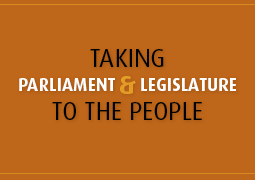
Challenges hindering the provision of quality healthcare services in rural towns and farm communities became the subject of intense discussions between delegates of the National Council of Provinces (NCOP) and Department of Health officials during pre-visits to the Free State in preparation for the NCOP’s Taking Parliament to the People programme.
The pre-visits form the first part of the Taking Parliament to the People programme and will be followed by the main event in August and later in the year a report-back session to the community. The programme forms part of efforts to ensure that the government delivers on commitments towards the realisation of the country’s ambitious National Development Plan (NDP) to end poverty and inequality by the year 2030.
The oversight pre-visits were conducted on the theme “Celebrating 20 years of the Constitution and 20 years since the establishment of the NCOP”. Provision of quality healthcare is part of the government’s apex priorities for service delivery and is also one of the major targets of the NDP and the Sustainable Development Goals (SDGs), the global agenda to end hunger, poverty and underdevelopment by the year 2030.
In a media briefing to officially launch the pre-visits, NCOP Chairperson Ms Thandi Modise said though the focus was on heath, the delegates would listen to any service delivery matters raised by the community, even when not related to the provision of healthcare.
“Although the focus for the preliminary oversight visit is on the provision of healthcare in the Free State province, the NCOP does not discourage the public from raising any service delivery challenges that were not related to health.
“We are aware that there are many that cannot be ignored and some of them could be resolved sooner than the actual Taking Parliament to the People. We are here to ensure that taxpayers’ money is well spent, as per the requirements of the Constitution,” she said.
NCOP House Chairperson for Committees and Oversight Mr Jomo Nyambi said the programme was not only ensuring public participation in Parliament’s business, but also served as a “major boost to the oversight role of the NCOP. Our job is to do oversight on those who are supposed to deliver the services to the people and make sure that our citizens come first,” he said.
Our research tells us that the Free State is doing badly in the provision of primary healthcare, but we are not here to be the judges, we are here to ensure that citizens get the attention they need.”
One of the major challenges affecting the operation of clinics in the Xhariep District is the lack of water. Xhariep clinics are not functioning well because of the water challenge in the district, despite being home to the country’s biggest dam, the Gariep. Furthermore, most clinics operate from 7.30 am to 4 pm on weekdays only, closing over the weekends.
Mr Xolile Mathwa, the Executive Mayor of Kopanong Local Municipality (one of the municipalities in the Xhariep District) told the NCOP that a cut in water services had been implemented by Bloem Water because of a debt of about R180 million that his municipality owed to the water supplier.
“We have a huge debt to Bloem Water. We inherited the debt from the transitional councils in the 1990s before the amalgamation of the town councils. We have engaged the relevant authorities and came up with a proposal to write off the interest – it is really killing us – so that we can service the actual amount. We appeal to NCOP delegates to come to our rescue,” he pleaded.
Officials also told the NCOP how the department is struggling to attract suitably qualified health professionals to work in rural towns and most preferred bigger cities.
NCOP delegate Ms Thandi Mphambo-Sibhukwana said it is a concern that patient transport has not been available for more than a year. “We need 24/7 medical services. The current situation gives an impression that our people don’t get sick at night and on weekends. We cannot allow this situation to continue like this,” said Ms Mphambo-Sibhukwana.
Chairperson Modise said the cutting of budgets should be done rationally and put the needs of the people first. “We need to have a dialogue with National Treasury about the rationale used in implementing budget cuts. We cannot be about guarding budgets. We need to worry about the souls,” she said.
The Chairperson of the Select Committee on Social Services, Ms Landulile Dlamini, who was Leader of the Delegation that focused on Kopanong, described the water problem in the area as “painful to hear”. She added that “without water we won’t be able to resolve the health issues and get our facilities to function efficiently”.
The biggest shock for the delegation was a revelation that a newly-constructed hospital, the Albert Nzula District Hospital, which should have opened in 2013, remained unused five years later because water and sewerage services were not available. This news was not well-received by NCOP delegates. Officials promised the delegation that it would open on 15 June 2017. The NCOP was not satisfied with the answers from the department and instructed the officials to provide authentic information on the state of the hospital.
“If water or infrastructure was there in 2013, would the hospital have opened? Who decided to build a hospital without the required infrastructure?” asked Ms Dlamini.
However, during a visit to Lephoi Clinic in Bethulie, NCOP delegates were impressed with the cleanliness of the facility and the welcoming attitude of staff.
Sakhile Mokoena
17 May 2017

